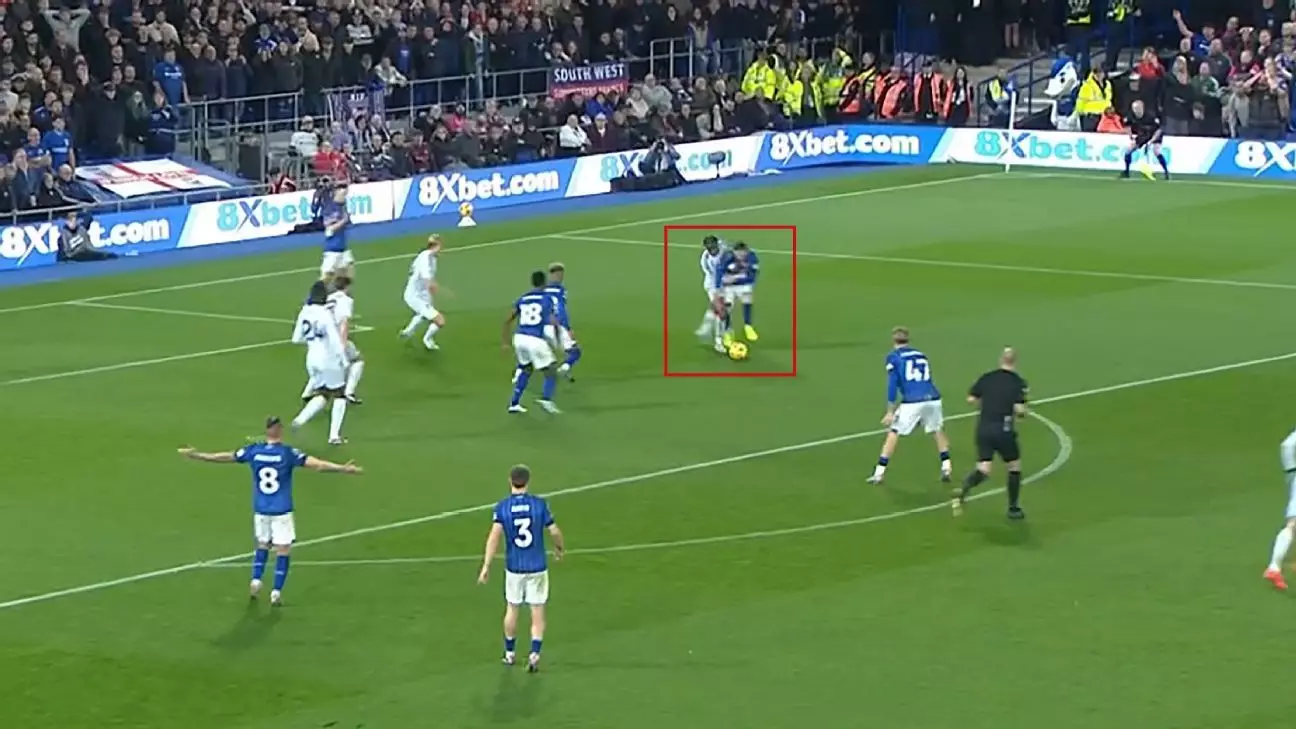In a stirring critique of the Video Assistant Referee (VAR) system, Ipswich Town chairman Mark Ashton has brought to light the frustrations felt by many within football regarding transparency, fairness, and consistency in officiating. Following a controversial 1-1 draw against Leicester City, during which Ipswich was denied a clear penalty, Ashton’s impassioned statements reflect the sentiments of many clubs outside of football’s elite circle. His remarks open a broader conversation that questions the integrity of the VAR system and its implications for clubs striving to compete at the highest levels.
The match against Leicester City marked a critical moment in the season for Ipswich Town, as they led 1-0 before a potentially game-altering incident occurred in the 77th minute. Conor Chaplin found himself in the penalty area, where he was clumsily brought down by Fatawu Issahaku. Despite the obvious foul, referee Tim Robinson opted to ignore the incident and let the play continue. This decision not only denied Ipswich a penalty but directly led to a series of further complications, including a second yellow card for player Kalvin Phillips, which transformed the momentum of the game.
Ashton emphasizes that’s not just about this single incident but speaks volumes about a pattern that is emerging. The chairman is disheartened by the reliance on technology that seems to fail in crucial moments, leaving clubs like Ipswich vulnerable to oversight and inconsistency in decision-making. It begs the question: Is VAR truly serving its intended purpose?
In the days leading up to the match, Ashton was candid about his doubts regarding VAR. He expressed his intention to voice his displeasure to Howard Webb, PGMOL’s chief refereeing officer, signaling a wish for constructive dialogue. His prior experience in football had instilled in him a level of skepticism about the reliability of VAR, and after witnessing the events unfold, he felt compelled to take action.
Notably, Ashton did not shy away from expressing his feelings about a potential vote on the future of VAR. His statement, “if I was asked to make that vote again tomorrow, I can’t look you in the eye and say I’d vote the same way,” reflects a deep-seated anger and frustration that many in the football community are beginning to understand. His emotional investment in the club shines through, making it clear that the perceived injustices extend beyond personal grievances—these are fundamental issues impacting the experience of supporters and players alike.
One of Ashton’s principal arguments lies in the inconsistency of VAR reviews. Throughout the 2023 season, Ipswich has experienced three decisions going against them—with no calls made in their favor. This track record raises serious concerns about the impartiality of refereeing. Ashton specifically points to instances where penalties were awarded to other clubs in similar situations but denied to Ipswich, suggesting a systemic failing in officiating standards.
He remarked, “All I ask for with refereeing and VAR is consistency, and we have not seen consistency.” This sentiment resonates with fans and clubs alike, as it demonstrates a pressing need for reform within the VAR framework. The lack of uniformity not only undermines the credibility of the officiating process but also places enormous pressure on clubs trying to navigate the competitive landscape of the Premier League.
Ashton’s dialogues with Howard Webb are expected to lead to further discussions among Ipswich Town leadership regarding the VAR situation. “We need to understand. I struggle to understand why we weren’t awarded a penalty,” Ashton stated, expressing a desire for clarity and solutions in the wake of ongoing frustrations. The meeting at Portman Road aims to address these essential questions, dissect the failures of VAR in their recent matches, and explore pathways for improvement.
While it’s still uncertain whether structural changes to VAR will occur, Ashton’s comments might serve as a catalyst for clubs to unite and demand reforms aimed at safeguarding the authenticity of competition. The potential for bias cannot be overlooked, and as Ashton suggested, an examination of statistics may reveal deeper trends that require urgent attention.
Mark Ashton’s passionate defense of Ipswich Town encapsulates a growing unrest among clubs navigating the complexities of modern football. By articulating concerns surrounding VAR, he not only fights for his club’s interests but also ignites a larger conversation about the fairness and transparency of officiating in the Premier League. As the spotlight on VAR intensifies, it becomes clear that ongoing dialogue and reform are not merely desirable—they are essential for restoring faith in the system and ensuring that all clubs, regardless of status, receive equitable treatment on the pitch.

